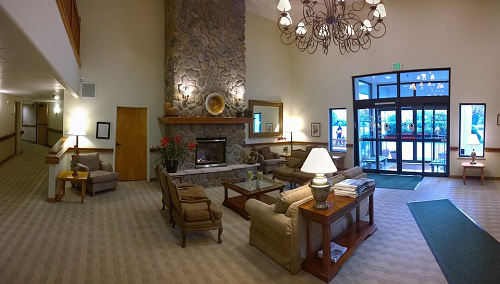There’s a good deal of overlap between hotel and hospitality management. In fact, the biggest distinction between the two is that hotel management is one narrow area of work within the larger discipline of hospitality management. Working in hospitality management can encompass work in many other areas, as well, including restaurant management, event planning and other areas of tourism development. As an aspiring hotel manager, you may wonder whether a general hospitality management program or a specialized hotel management program is a better choice for you.
IMAGE SOURCE: Pixabay, public domain
General Studies and Career Opportunities in Hospitality Management
When you pursue a general program in hospitality management, you develop a foundation in all areas of hospitality management. You take the business courses in accounting, marketing, human resources, management strategies and administration that are relevant not only in all areas of tourism but also in all areas of business.
When it comes to your major coursework in hospitality, you will study the skills needed for a breadth of job opportunities. Some coursework, like hotel operations, will be particularly relevant to your interests. These courses may include matters of hotel security measures, housekeeping measures and operational strategies as well as an introduction to property management computer software widely used in the hotel industry. Other hospitality courses may not be as closely related to your career goals. Food service sanitation, catering and events planning and restaurant operations may not seem valuable – but, if you end up working at a hotel with a full-service kitchen or meeting and conference rooms, you may find that you draw on these skills more than you expected to.
Hospitality management programs prepare students for many different tourism roles. Your ultimate job title with this degree may be hotel manager, but it could just as easily be restaurant manager, event planner, spa director, resort manager or any number of other administrative roles in hospitality. The benefit of this broad program of study is a more versatile degree and set of skills, but the drawback is that you don’t have as extensive an academic background in the operations of hotels specifically.
One way you can focus your education as a hospitality management student is to strategically seek out field experiences and internships in hotels, which serves the dual purpose of gaining relevant experience for your resume and networking with established professionals in hotel management.
Specialized Curricula in Hotel Management
There are college programs in hotel management specifically. Available at the certificate, associate’s and bachelor’s levels, these programs of study go into greater depth regarding the knowledge and skills specific to the hotel management industry, as opposed to exploring the breadth of the hospitality management field.
Some of the major-specific courses you may take in a hotel management program include principles of hotel management, resort operations, property operations, housekeeping, front office operations and purchasing and cost control. Because many high-end hotels also have a full-service kitchen, your curriculum may also include some studies in restaurant operations, including dining room service, sanitation measures, kitchen operations, menu planning, bartending and introduction to wines and serving alcohol. Hands-on coursework in the culinary arts may also be required. Courses in banquet, entertainment and event planning are valuable for aspiring hotel managers who end up working at hotels that host weddings, conferences and other events.
Although not specific to hotel management, courses in hospitality marketing, hospitality law and human resources for hospitality professionals are common, and valuable, parts of the curriculum.
The Work of a Hotel Manager
A hotel manager’s work encompasses just about anything required to keep the hotel running smoothly in its daily operations and to achieve long-term success. The tasks reported as the most important to the career by actual hotel managers include responding to guests’ questions and complaints, setting rates for rooms and budgets for the company, coordinating hotel activities, greeting guests, tracking financial performance, maintaining the facilities and training and scheduling staff.
There are different kinds of lodging and hotel managers whose job duties can differ significantly. A revenue manager focuses primarily on the financial performance of the hotel, according to the United States Bureau of Labor Statistics (BLS). The job duties of revenue managers include tracking revenue and expenses, predicting how many rooms of the hotel will be full and determining when, how and how much to discount room rates to improve sales. On the other hand, a front-office manager handles very different duties, like fielding special requests, coordinating reservations and supervising the front-desk employees who check in guests and handle billing matters.
Not all hotels have managers in multiple specialized work areas. At small hotels, general managers may be responsible for all of these job duties. At larger hotels, a general manager may be the top management position under which specialized hotel managers work.
Additional Resources
Would My Degree in Hotel Management Allow Me to Get a Job in Another Country?
Am I Better Off Getting a Job at a Hotel or Going Straight to Getting a Degree in Hotel Management?
What Personality Traits Are Most Important for a Career in Hotel Management?
Can I Get a Job as a Hotel Manager Without a Degree in Hotel Management?

